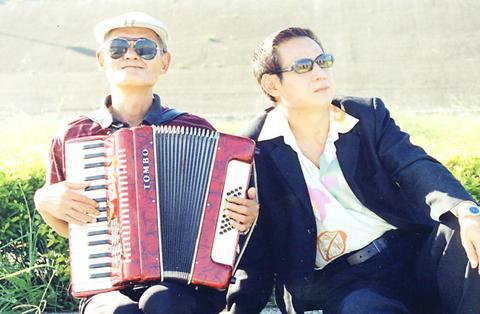What happens when you have a merciless but superstitious gang leader, a group of religious fanatics and a street-smart gambling addict, who, in order to run away from debt collectors, makes up up a series of lies and jokes?
Normally, such elements might make for a decent black comedy story. But in the case of Comes the Black Dog (黑狗來了), the movie looks as if it has been made so hurriedly that it has killed off most of the good comedy.
Black Dog (Tsai Cheng-nan (蔡振南) is dumb gangster leader who is chasing Jih (Tai-bao (太保)) for a gambling debt. Jih makes up a story that he needs money for his father's funeral and Black Dog fall for it because Jih's father Da-de (Lee Bin-hui (李炳輝)) was a good friend and benefactor who once saved Black Dog's life.

PHOTO COURTESY OF CMPC
As a result of this situation, Jih has to make bigger lies just to keep Black Dog off his back. He even hires Taoist monks for the "funeral."
He also quickly sends his blind father to his younger brother Lih (Chen Mu-yi (陳慕義)) in the countryside, who is a policeman, but dreams of becoming a Taoist cult leader and owning his own temple. Lih's wife Bao-ju (Lin Mei-hsiu (林美秀)) owns a cheesy dance troupe that performs pole dances at local bars and funerals.
The film mocks contemporary Taiwanese lifestyles, such as local gangster culture, entertainers, Taoist freaks and their rituals, and betelnut girls. These images may serve to add color to the story, but in general they are not very funny and look cliched.
Among the actors, Jih is the most convincing and Tai-bao does well playing a habitual liar and irresponsible husband. Lin Mei-hsiu, who won a Golden Horse for Best Supporting Actress, is reasonably good as the non-stop nagger and her lines (in Taiwanese) are quite funny.
The biggest problem is that there are too many other storylines and none of them are handled particularly well. As a result, no-one actually cares happens what happens when Black Dog attends the absurd fake funeral.

April 14 to April 20 In March 1947, Sising Katadrepan urged the government to drop the “high mountain people” (高山族) designation for Indigenous Taiwanese and refer to them as “Taiwan people” (台灣族). He considered the term derogatory, arguing that it made them sound like animals. The Taiwan Provincial Government agreed to stop using the term, stating that Indigenous Taiwanese suffered all sorts of discrimination and oppression under the Japanese and were forced to live in the mountains as outsiders to society. Now, under the new regime, they would be seen as equals, thus they should be henceforth

Last week, the the National Immigration Agency (NIA) told the legislature that more than 10,000 naturalized Taiwanese citizens from the People’s Republic of China (PRC) risked having their citizenship revoked if they failed to provide proof that they had renounced their Chinese household registration within the next three months. Renunciation is required under the Act Governing Relations Between the People of the Taiwan Area and the Mainland Area (臺灣地區與大陸地區人民關係條例), as amended in 2004, though it was only a legal requirement after 2000. Prior to that, it had been only an administrative requirement since the Nationality Act (國籍法) was established in

With over 80 works on display, this is Louise Bourgeois’ first solo show in Taiwan. Visitors are invited to traverse her world of love and hate, vengeance and acceptance, trauma and reconciliation. Dominating the entrance, the nine-foot-tall Crouching Spider (2003) greets visitors. The creature looms behind the glass facade, symbolic protector and gatekeeper to the intimate journey ahead. Bourgeois, best known for her giant spider sculptures, is one of the most influential artist of the twentieth century. Blending vulnerability and defiance through themes of sexuality, trauma and identity, her work reshaped the landscape of contemporary art with fearless honesty. “People are influenced by

The remains of this Japanese-era trail designed to protect the camphor industry make for a scenic day-hike, a fascinating overnight hike or a challenging multi-day adventure Maolin District (茂林) in Kaohsiung is well known for beautiful roadside scenery, waterfalls, the annual butterfly migration and indigenous culture. A lesser known but worthwhile destination here lies along the very top of the valley: the Liugui Security Path (六龜警備道). This relic of the Japanese era once isolated the Maolin valley from the outside world but now serves to draw tourists in. The path originally ran for about 50km, but not all of this trail is still easily walkable. The nicest section for a simple day hike is the heavily trafficked southern section above Maolin and Wanshan (萬山) villages. Remains of